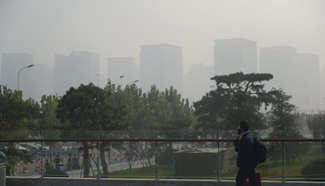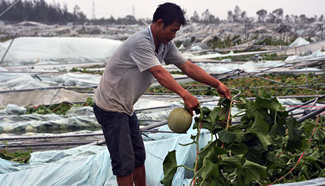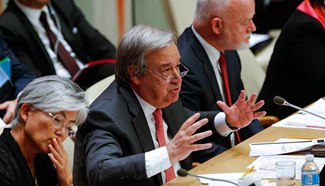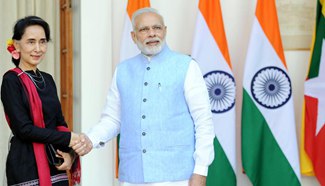by Abdul Haleem, Jawed Omid
KABUL, Oct. 20 (Xinhua) -- Desperately waiting at a cash center in Pul-e-Charkhi to receive her repatriation and reintegration grant of 400 U.S. dollars provided by the UN High Commissioner for Refugees (UNHCR), a 70-year-old women question how her family was supposed to live on such a paltry amount.
Bibi Hawa, who had escaped the war-torn region to live as a refugee in Pakistan 30 years ago, said that little had changed since she was away and the country remained plagued by terrorism and militancy.
A resident of northern Baghlan province who went to live in Punjab in Pakistan said she sees "no difference in the security situation in Baghlan even after 30 years when I left my homeland in hope of peace returning to Afghanistan one day."
The relatively volatile Baghlan province with Pul-e-Khumri as its capital, located 160 km north of Kabul, was the center of resistance against the invading forces of the former Soviet Union in the 1980s and nowadays is the center of tussle between the hardliner Taliban group and government forces.
More than 100 people, including civilians, militants and security forces personnel, have been killed, injured or maimed due to the bloody fighting between government forces and the Taliban in the restive province over the past couple of months. Countless others have been left homeless, according to local officials.
Although the elderly Hawa feels sorrow over her return to her home country after three decades of living in exile, she also believes that she has no choice but to adjust her life back in Pul-e-Khumri.
"Even though I have no house and no income to resettle in my home province of Baghlan, I have no option but to live here," Hawa, a widow and head of a six-member family, told Xinhua.
Pakistan is currently home to more than 2.5 million Afghan refugees and until recently they didn't need a passport or travel documents to cross the border between the two neighbors.
However, the Pakistani government in the wake of brief exchanges of fire at the Torkham border crossing in June, has toughened its ground security measures and asked Afghan refugees to leave the country or stay with legal documents including a valid visa.
Islamabad has extended Afghan refugees' stay until the end of March 2017, the repatriation process has gained momentum and according to UNHCR spokesman Nadir Farhad, some 5,000 Afghan refugees return home daily.
According to Farhad, more than 240,000 Afghan refugees have returned to their homeland from Pakistan since January this year.
Amanullah, another returnee who is worried about the future of his family, said he returned to his home province of Parwan after 26 years living as a refugee in Pakistan.
"The new restrictions forced me to return to my country where I have no job, no security and no shelter to live in," said 67-year-old Amanullah, the head of a family of six.
Afghanistan's Minister of Refugees and Repatriation Affairs, Sayed Hossein Alimi Balkhi, said the government would provide land for the returnees to build homes and reintegrate back into their communities.
Nevertheless, the returnees are doubtful about the government's ability to efficiently provide shelter and new job opportunities for the former refugees returning home.
"My family escaped the war in Afghanistan 36 years ago and I was born in Punjab in Pakistan and had a shop until I returned two weeks ago," Habibullah, 18, told Xinhua, adding that he was distrustful of the government's promise to provide a home and land and life would probably be miserable due to the ongoing conflict.
More than 1.1 million people have been displaced by the conflict over the past 15 years in Afghanistan and 277,331 people in 2016, according to visiting UN Special Rapporteur on the human rights of internally displaced persons Chaloka Beyani.
More than 4 million Afghan refugees have returned home from Pakistan since the collapse of the Taliban regime in late 2001, Beyani said.












